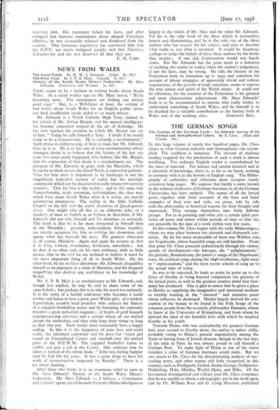NEWS FROM WALES
THERE seems to: be a fashion in writing books about South Wales. As a social worker says in Mr. Mais' novel, " We're
becoming news. The newspapers are finding our misery good copy." But, to, a Welshman at least, the writing of bad books about South Wales for an English public seems one final insufferable insult added to so much misery.
Mr. Edwards is a Welsh Catholic High Tory, trained in the school of Mr. Arthur Bryant, and his natural intelligence has become somewhat warped in the air of Ashridge. He has now reached the position in which Mr. Bryant can say of him, " Today he calls himself a Tory. I doubt if he would
claim to be a Conservative. He is certainly a revolutionary." Such praise is embarrassing, at least to read, but Mr. Edwards lives up to it. He is in fact one of those revolutionaries whose strongest desire is to believe that the history of the last 15o years has never really happened, who believe, like Mr. Bryant, that the expression of that desire is a revolutionary act. The prospect of Mr. Edwards at grips with the Rhondda, which he seems to think means the Good Patch, is somewhat pathetic. Thus for him what is important in its landscape is not the magnificent industrial scenery of today but the nostalgic countryside which can be discovered in early nineteenth-century memoirs. This for him is the reality ; and in the same way Nonconformity, trade unionism, industrialism, the class war, which have made South Wales what it is today, are merely
unfortunate aberrations. The reality is the little Catholic Church on the hill and the social doctrines of Quadragesinzo Anno. One might take all this as an elaborate joke, or a mockery of men so foolish as to believe in Socialism, if Mr. Edwards did not take himself and his doctrines so seriously.
The truth is that he is far more interested in himself than in the Rhondda ; poverty, industrialism, labour troubles, are merely occasions for him to indulge his obsessions and ignore what lies beneath his nose. His greatest obsession is, of course, Marxism. Again and again he assures us that it is Use, wicked, doctrinaire, irrelevant, unrealistic ; but he does it so often and, on his own evidence, with so little excuse, that in the end we are inclined to believe it must be the most important thing of all in South Wales. On the other hand, by his reckless distortions Mr. Edwards disqualifies himself as an exponent or a critic of Marxism, and his frequent mispellings also destroy any confidence in his knowledge of Welsh.
Mr. S. P. B. Mais is as revolutionary as Mr. Edwards, and, though less explicit, he may be said to share some of the same beliefs ; but perhaps this is to take his novel too seriously.
It is the story of a lustful coalowner who becomes a social worker and learns to love a poor, pure Welsh girl ; of a wicked, hypocritical, socialist local preacher who seduces the fiancée of a crippled ,foOtballing miner and by betraying his comrades becomes a great industrial magnate ; of hearts of gold beneath unprepossessing exteriors and a society where all are wicked except the underdogs, and they only keep their virtue so long as they stay put. Such stories must necessarily have a happy ending. In this it is the happiness of pure love and social work; the reformed coalowrier and his poor but honest girl found an Unemployed Centre and triumph over the wicked plots of the N.U.W.M. The crippled footballer learns to cobble and gets a job at the Centre. One sentence may be taken as typical of the whole book : " John was feeling happier than he had felt for years.. It was a great thing to have his work of reconstruction inspected by Royalty." There is a lot about hunting.
After these two books it is an enormous relief to turn to Mr. Ness Edwards' History of the South Wales Miners'
Federation. Mr. Ness Edwards is, I believe, a Communist and a miners' agent, one of the melodramatic villains who figure so
largely in the minds of Mr. Mais and the other Mr. Edwards. Yet his is the only book of the three which is instructive, honest and illuminating, and he is the only one of the three authors who has respect for his subject, and tries to describe what really is, not what is invented. It would be disastrous perhaps to judge the beliefs of these three authors by the books they inspire ; if one did, Communism would win hands down. For Mr. Edwards has the great merit in a historian of enabling the reader to realise when the author's judgement, if not his facts, may be wrong. He tells the history of the Federation from its formation up to 1935, and somehow his account of labour struggles, of apparently trivial and tedious negotiations, of the growth of trade unionism, seems to express the true nature and spirit of the Welsh miner. It could not be otherwise, for the creation of the Federation is his greatest and most characteristic achievement. Mr. Ness Edwards' book is to be recommended to anyone who really wishes to understand something of South Wales, and he himself is to be thanked for a valuable contribution to the history both of Wales and of the working class. GORONWY REES.


















































 Previous page
Previous page